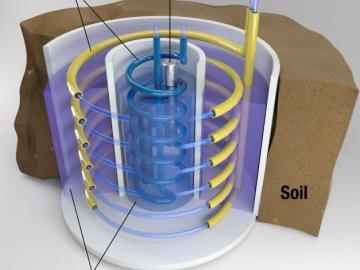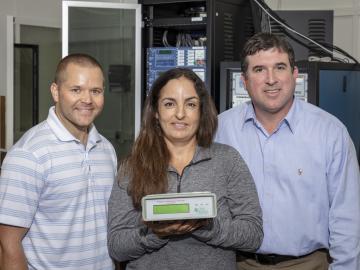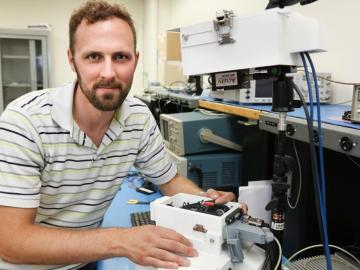
Filter News
Area of Research
- (-) Energy Science (42)
- (-) Supercomputing (40)
- Biology and Environment (10)
- Computer Science (2)
- Energy Sciences (1)
- Fusion Energy (2)
- Isotopes (1)
- Materials (51)
- Materials for Computing (5)
- National Security (8)
- Neutron Science (19)
- Nuclear Science and Technology (7)
- Quantum information Science (3)
- Sensors and Controls (1)
News Topics
- (-) Biomedical (11)
- (-) Computer Science (39)
- (-) Energy Storage (17)
- (-) Grid (10)
- (-) Materials Science (15)
- (-) Microscopy (4)
- (-) Security (2)
- (-) Summit (16)
- 3-D Printing/Advanced Manufacturing (21)
- Advanced Reactors (3)
- Artificial Intelligence (8)
- Big Data (10)
- Bioenergy (10)
- Biology (2)
- Biotechnology (1)
- Chemical Sciences (2)
- Clean Water (1)
- Composites (1)
- Coronavirus (14)
- Critical Materials (1)
- Cybersecurity (3)
- Environment (22)
- Exascale Computing (3)
- Frontier (1)
- Fusion (1)
- High-Performance Computing (2)
- Isotopes (1)
- Machine Learning (7)
- Materials (2)
- Mathematics (2)
- Mercury (1)
- Molten Salt (1)
- Nanotechnology (5)
- National Security (1)
- Neutron Science (10)
- Nuclear Energy (3)
- Physics (3)
- Polymers (6)
- Quantum Science (10)
- Space Exploration (1)
- Transportation (18)
Media Contacts

Scientists at have experimentally demonstrated a novel cryogenic, or low temperature, memory cell circuit design based on coupled arrays of Josephson junctions, a technology that may be faster and more energy efficient than existing memory devices.

Oak Ridge National Laboratory researchers created a geothermal energy storage system that could reduce peak electricity demand up to 37% in homes while helping balance grid operations.

To better determine the potential energy cost savings among connected homes, researchers at Oak Ridge National Laboratory developed a computer simulation to more accurately compare energy use on similar weather days.

Researchers at ORNL have developed a quantum chemistry simulation benchmark to evaluate the performance of quantum devices and guide the development of applications for future quantum computers.

Researchers across the scientific spectrum crave data, as it is essential to understanding the natural world and, by extension, accelerating scientific progress.

As Puerto Rico works to restore and modernize its power grid after last year’s devastating hurricane season, researchers at Oak Ridge National Laboratory have stepped up to provide unique analysis, sensing and modeling tools to better inform decisions.

Oak Ridge National Laboratory scientists have devised a method to control the heating and cooling systems of a large network of buildings for power grid stability—all while ensuring the comfort of occupants.

Long-haul tractor trailers, often referred to as “18-wheelers,” transport everything from household goods to supermarket foodstuffs across the United States every year. According to the Bureau of Transportation Statistics, these trucks moved more than 10 billion tons of goods—70.6 ...

Oak Ridge National Laboratory scientists have developed a crucial component for a new kind of low-cost stationary battery system utilizing common materials and designed for grid-scale electricity storage. Large, economical electricity storage systems can benefit the nation’s grid ...

As leader of the RF, Communications, and Cyber-Physical Security Group at Oak Ridge National Laboratory, Kerekes heads an accelerated lab-directed research program to build virtual models of critical infrastructure systems like the power grid that can be used to develop ways to detect and repel cyber-intrusion and to make the network resilient when disruption occurs.


